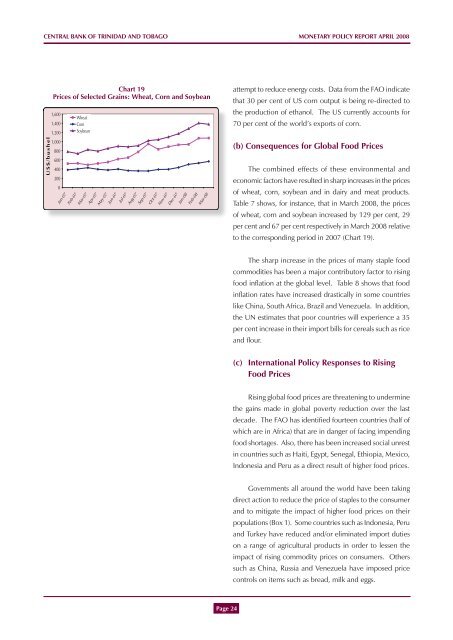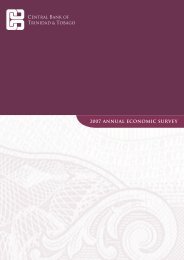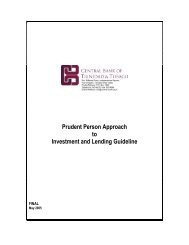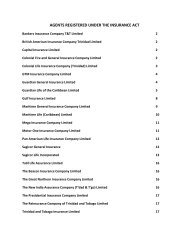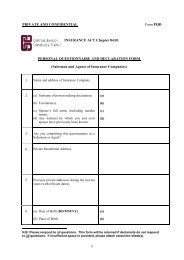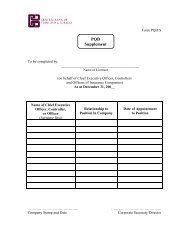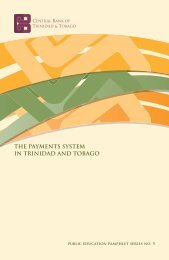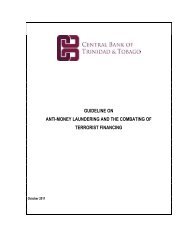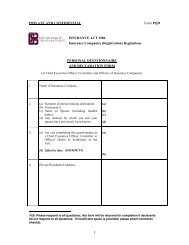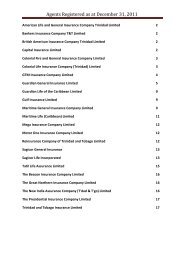April 2008 Report - Central Bank of Trinidad and Tobago
April 2008 Report - Central Bank of Trinidad and Tobago
April 2008 Report - Central Bank of Trinidad and Tobago
You also want an ePaper? Increase the reach of your titles
YUMPU automatically turns print PDFs into web optimized ePapers that Google loves.
CENTRAL BANK OF TRINIDAD AND TOBAGO MONETARY POLICY REPORT APRIL <strong>2008</strong><br />
Chart 19<br />
Prices <strong>of</strong> Selected Grains: Wheat, Corn <strong>and</strong> Soybean<br />
attempt to reduce energy costs. Data from the FAO indicate<br />
that 30 per cent <strong>of</strong> US corn output is being re-directed to<br />
the production <strong>of</strong> ethanol. The US currently accounts for<br />
70 per cent <strong>of</strong> the world’s exports <strong>of</strong> corn.<br />
(b) Consequences for Global Food Prices<br />
The combined effects <strong>of</strong> these environmental <strong>and</strong><br />
economic factors have resulted in sharp increases in the prices<br />
<strong>of</strong> wheat, corn, soybean <strong>and</strong> in dairy <strong>and</strong> meat products.<br />
Table 7 shows, for instance, that in March <strong>2008</strong>, the prices<br />
<strong>of</strong> wheat, corn <strong>and</strong> soybean increased by 129 per cent, 29<br />
per cent <strong>and</strong> 67 per cent respectively in March <strong>2008</strong> relative<br />
to the corresponding period in 2007 (Chart 19).<br />
The sharp increase in the prices <strong>of</strong> many staple food<br />
commodities has been a major contributory factor to rising<br />
food inflation at the global level. Table 8 shows that food<br />
inflation rates have increased drastically in some countries<br />
like China, South Africa, Brazil <strong>and</strong> Venezuela. In addition,<br />
the UN estimates that poor countries will experience a 35<br />
per cent increase in their import bills for cereals such as rice<br />
<strong>and</strong> flour.<br />
(c) International Policy Responses to Rising<br />
Food Prices<br />
Rising global food prices are threatening to undermine<br />
the gains made in global poverty reduction over the last<br />
decade. The FAO has identified fourteen countries (half <strong>of</strong><br />
which are in Africa) that are in danger <strong>of</strong> facing impending<br />
food shortages. Also, there has been increased social unrest<br />
in countries such as Haiti, Egypt, Senegal, Ethiopia, Mexico,<br />
Indonesia <strong>and</strong> Peru as a direct result <strong>of</strong> higher food prices.<br />
Governments all around the world have been taking<br />
direct action to reduce the price <strong>of</strong> staples to the consumer<br />
<strong>and</strong> to mitigate the impact <strong>of</strong> higher food prices on their<br />
populations (Box 1). Some countries such as Indonesia, Peru<br />
<strong>and</strong> Turkey have reduced <strong>and</strong>/or eliminated import duties<br />
on a range <strong>of</strong> agricultural products in order to lessen the<br />
impact <strong>of</strong> rising commodity prices on consumers. Others<br />
such as China, Russia <strong>and</strong> Venezuela have imposed price<br />
controls on items such as bread, milk <strong>and</strong> eggs.<br />
Page 24


